Ford Mustang Mach-E vs VW Tiguan – Differences & prices compared
Compare performance, boot capacity, efficiency and price at a glance.
Find out which car is the better choice for you – Ford Mustang Mach-E or VW Tiguan?
Costs and Efficiency:
When it comes to price and running costs, the biggest differences usually appear. This is often where you see which car fits your budget better in the long run.
VW Tiguan has a significantly advantage in terms of price – it starts at 32800 £, while the Ford Mustang Mach-E costs 48400 £. That’s a price difference of around 15643 £.
As for range, the Ford Mustang Mach-E performs decisively better – achieving up to 600 km, about 471 km more than the VW Tiguan.
Engine and Performance:
Power, torque and acceleration say a lot about how a car feels on the road. This is where you see which model delivers more driving dynamics.
When it comes to engine power, the Ford Mustang Mach-E has a convincingly edge – offering 487 HP compared to 272 HP. That’s roughly 215 HP more horsepower.
In acceleration from 0 to 100 km/h, the Ford Mustang Mach-E is significantly quicker – completing the sprint in 3.80 s, while the VW Tiguan takes 5.90 s. That’s about 2.10 s faster.
In terms of top speed, the VW Tiguan performs somewhat better – reaching 242 km/h, while the Ford Mustang Mach-E tops out at 200 km/h. The difference is around 42 km/h.
There’s also a difference in torque: Ford Mustang Mach-E pulls convincingly stronger with 950 Nm compared to 400 Nm. That’s about 550 Nm difference.
Space and Everyday Use:
Beyond pure performance, interior space and usability matter most in daily life. This is where you see which car is more practical and versatile.
Both vehicles offer seating for 5 people.
In curb weight, VW Tiguan is evident lighter – 1599 kg compared to 2161 kg. The difference is around 562 kg.
In terms of boot space, the VW Tiguan offers distinct more room – 652 L compared to 519 L. That’s a difference of about 133 L.
In maximum load capacity, the VW Tiguan performs to a small extent better – up to 1650 L, which is about 230 L more than the Ford Mustang Mach-E.
When it comes to payload, VW Tiguan somewhat takes the win – 533 kg compared to 450 kg. That’s a difference of about 83 kg.
Who wins the race?
The Ford Mustang Mach-E proves to be outperforms in nearly all aspects and therefore becomes our DriveDuel Champion!
Ford Mustang Mach-E is the better all-rounder in this comparison.
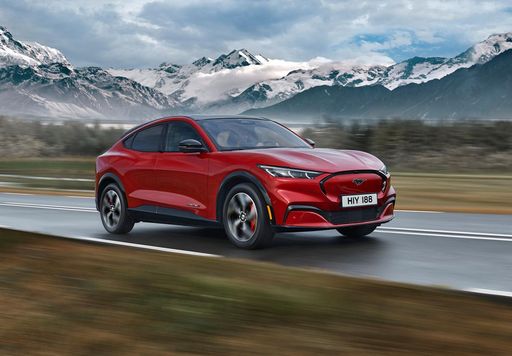
Ford Mustang Mach-E
Ford Mustang Mach-E
The Ford Mustang Mach-E marks a new chapter in the legacy of the iconic American brand, combining classic muscle car aesthetics with modern electric vehicle technology. Its sleek design captures the spirit of innovation while offering a spacious and tech-savvy interior for enhanced driving comfort. The Mach-E promises an exhilarating driving experience, packed with cutting-edge features that set a new standard for electric SUVs.
details @ mustang.fordpresskits.com
@ mustang.fordpresskits.com
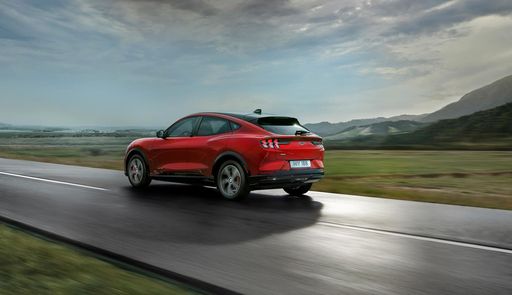 @ mustang.fordpresskits.com
@ mustang.fordpresskits.com
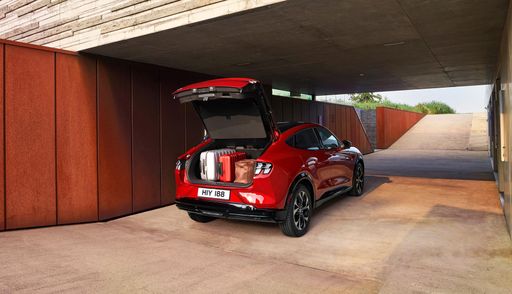 @ mustang.fordpresskits.com
@ mustang.fordpresskits.com
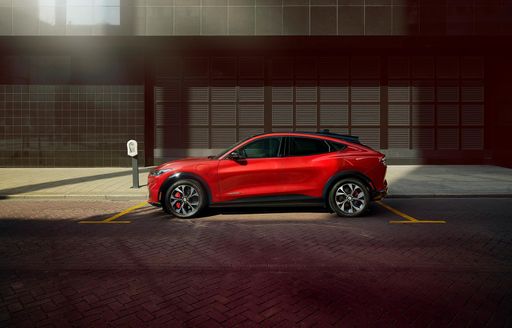 @ mustang.fordpresskits.com
@ mustang.fordpresskits.com
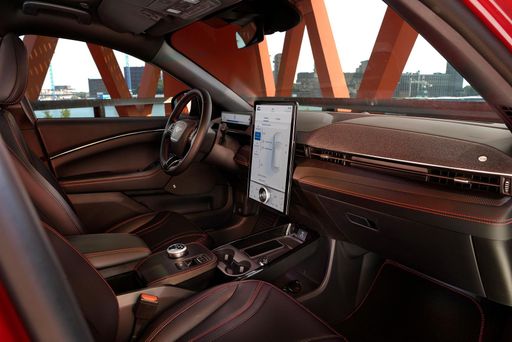 @ mustang.fordpresskits.com
@ mustang.fordpresskits.com
VW Tiguan
The VW Tiguan presents itself as a versatile and practical option in the SUV market, combining a stylish design with a spacious and comfortable interior. It offers a smooth driving experience, making it well-suited for both urban environments and longer journeys. With its focus on safety and innovative technology features, the Tiguan remains a compelling choice for families and adventurers alike.
details @ Volkswagen
@ Volkswagen
 @ Volkswagen
@ Volkswagen
 @ Volkswagen
@ Volkswagen
 @ Volkswagen
@ Volkswagen
 @ Volkswagen
@ Volkswagen
 @ Volkswagen
@ Volkswagen

|

|
|
|
|
Costs and Consumption |
|
|---|---|
|
Price
48400 - 66900 £
|
Price
32800 - 51900 £
|
|
Consumption L/100km
-
|
Consumption L/100km
0.4 - 8.4 L
|
|
Consumption kWh/100km
17.7 - 21 kWh
|
Consumption kWh/100km
-
|
|
Electric Range
470 - 600 km
|
Electric Range
119 - 129 km
|
|
Battery Capacity
73 - 91 kWh
|
Battery Capacity
19.70 kWh
|
|
co2
0 g/km
|
co2
8 - 190 g/km
|
|
Fuel tank capacity
-
|
Fuel tank capacity
45 - 58 L
|
Dimensions and Body |
|
|---|---|
|
Body Type
SUV
|
Body Type
SUV
|
|
Seats
5
|
Seats
5
|
|
Doors
5
|
Doors
5
|
|
Curb weight
2161 - 2351 kg
|
Curb weight
1599 - 1890 kg
|
|
Trunk capacity
519 L
|
Trunk capacity
490 - 652 L
|
|
Length
4713 - 4743 mm
|
Length
4539 mm
|
|
Width
1881 mm
|
Width
1842 - 1859 mm
|
|
Height
1613 - 1624 mm
|
Height
1656 - 1658 mm
|
|
Max trunk capacity
1345 - 1420 L
|
Max trunk capacity
1486 - 1650 L
|
|
Payload
368 - 450 kg
|
Payload
460 - 533 kg
|
Engine and Performance |
|
|---|---|
|
Engine Type
Electric
|
Engine Type
Plugin Hybrid, Petrol, Petrol MHEV, Diesel
|
|
Transmission
Automatic
|
Transmission
Automatic
|
|
Transmission Detail
Reduction Gearbox
|
Transmission Detail
Dual-Clutch Automatic
|
|
Drive Type
Rear-Wheel Drive, All-Wheel Drive
|
Drive Type
Front-Wheel Drive, All-Wheel Drive
|
|
Power HP
268 - 487 HP
|
Power HP
130 - 272 HP
|
|
Acceleration 0-100km/h
3.8 - 6.2 s
|
Acceleration 0-100km/h
5.9 - 10.6 s
|
|
Max Speed
180 - 200 km/h
|
Max Speed
198 - 242 km/h
|
|
Torque
525 - 950 Nm
|
Torque
220 - 400 Nm
|
|
Number of Cylinders
-
|
Number of Cylinders
4
|
|
Power kW
197 - 358 kW
|
Power kW
96 - 200 kW
|
|
Engine capacity
-
|
Engine capacity
1498 - 1984 cm3
|
General |
|
|---|---|
|
Model Year
2025
|
Model Year
2024 - 2025
|
|
CO2 Efficiency Class
A
|
CO2 Efficiency Class
B, G, D, E, F
|
|
Brand
Ford
|
Brand
VW
|
What drive types are available for the Ford Mustang Mach-E?
The Ford Mustang Mach-E is offered with Rear-Wheel Drive or All-Wheel Drive.
The prices and data displayed are estimates based on German list prices and may vary by country. This information is not legally binding.
